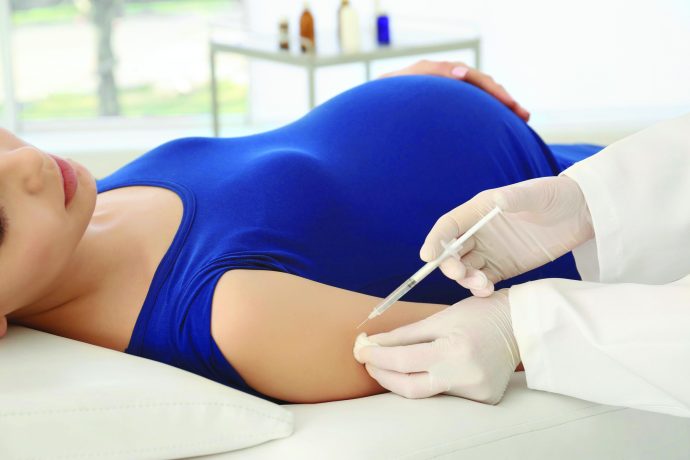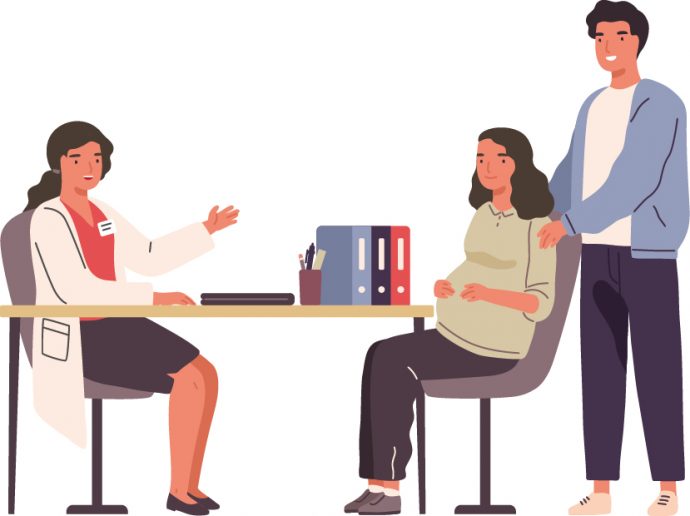The arrival of COVID-19 vaccine is good news for all, but as a pregnant mum, you may wonder if it is okay for you to get the vaccine. Is it safe for the mother and the baby? What about other vaccines?
Why vaccinate during pregnancy?
Mothers share many things with their baby when they are pregnant: their nutrients, oxygen, antibodies. Hence, when they receive vaccination, pregnant mums not only protect themselves, but also pass the immunity to their baby through the placenta. This provides passive protection to newborns during the first few crucial weeks when they are still too young to receive routine vaccination themselves.
Other than that, some women may have incomplete immunisation during childhood and are vulnerable to infections that can be detrimental to them or their unborn child; hence, it is good to do a pre-pregnancy test. Booster shots and annual vaccination may also be needed for certain vaccines to ensure better protection for mums and babies.
Is it safe?
Generally, live attenuated virus and bacterial vaccines are not recommended during pregnancy due to theoretical risks to the foetus. Instead, vaccines made with toxoids or killed (inactivated) bacteria or viruses can be given during pregnancy when recommended by doctors.
The Centres for Disease Control and Prevention (CDC) USA states that, “Benefits of vaccinating pregnant women usually outweigh potential risks when the likelihood of disease exposure is high, when infection would pose a risk to the mother or foetus, and when the vaccine is unlikely to cause harm.”
Recommended vaccines
- Tetanus/diphtheria/pertussis (Tdap): Pregnant women are recommended to get Tdap, ideally between 27 and 36 weeks of pregnancy, to provide their baby with short-term early protection during the first few weeks of life, especially against pertussis (whooping cough). This is crucial as pertussis can be fatal to newborns and the symptoms may not be obvious as many babies with the disease do not cough and simply stop breathing.
- Influenza (inactivated): Pregnant women are more prone to catch the flu and this increases their risk of premature labour and delivery. The flu shot is recommended for women who are pregnant before or during the flu season. It can be taken anytime during pregnancy. It also protects newborns from flu for several months after birth.
- Hepatitis B (HepB): Pregnant women who have high risk of being infected with the virus (e.g. history of STD, injection drug use) should be vaccinated to protect both mothers and babies. Babies can get infected with hepatitis B from mothers during gestation and at birth. A series of three doses is necessary to obtain the immunity (the 2nd and 3rd doses are given 1 and 6 months after the 1st dose), so it should be initiated early in pregnancy or before pregnancy.
- Travel-related: Pregnant women planning to travel abroad should consult doctors at least 4 to 6 weeks before the trip to see if they need any vaccination. Among vaccines recommended for travellers include anthrax, rabies, typhoid and yellow fever, depending on the risk.
Vaccines NOT recommended DURING pregnancy
Vaccines containing live viruses or bacteria are generally not recommended during pregnancy due to potential risk of birth complications. These include HPV (human papilloma virus), influenza (nasal spray), MMR (mumps/measles/rubella), varicella, zoster and BCG vaccines. Women planning for pregnancy should check their immunity against rubella and varicella, and if required, get their vaccination at least one month before trying to get pregnant.
On COVID-19 vaccines
Generally, all COVID-19 vaccines should not pose harm to pregnant women and their baby as none of the vaccines approved contain live viruses. Thus, if you are pregnant, you can take the vaccine, but you are advised to consult your doctor first. According to WHO, pregnant women can be vaccinated with COVID-19 vaccine if the benefits overweight the risks. When the article is written, all three vaccines available in Malaysia have been approved for pregnant women. However, Pfizer vaccine is still prioritised to be given to them during the 14th – 33rd weeks of pregnancy.
If you are pregnant or planning for pregnancy, get a thorough check-up and consult your doctor to see if any vaccination is necessary or recommended. Your doctor will ensure that you receive the best protection for yourself and your baby. And don’t forget to follow the immunisation schedule for your newborn after delivery!
An educational collaboration with Obstetrical and Gynaecological Society of Malaysia.







Comments